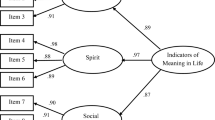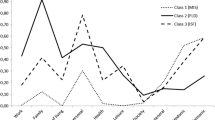Abstract
This paper describes an effort to construct social life feeling scales (self-determination, trust, future outlook, and so forth) for use in both American and German samples. Unidimensional scales (as defined) based on American respondents were modified as required to meet the same criteria in a German sample. Scales based on the German sample were modified as required to meet the same criteria among the American respondents. These modified scales were combined in order to meet given criteria of unidimensionality in both samples. Although combined scales meet (approximately) criteria of unidimensionality in both samples (German and American), the question of whether the feelings underlying these scales are identical in both populations remains.
Similar content being viewed by others
Bibliography
Andersen, E. B.: 1980, Discrete Statistical Models with Social Science Applications (Elsevier, North Holland, New York).
Bartholomew, D. J.: 1984, ‘Scaling binary data using a factor model’, The Journal of the Royal Statistical Society, Series B, 46: 1, pp. 120–123.
Bartholomew, D. J.: 1987, Latent Variable Models and Factor Analysis (Charles Griffin and Co., London).
Hulin, C. L., F.Drasgow, and C. K.Parsons: 1983, Item Response Theory (Dow Jones-Irwin, Homewood, Ill.).
Jackson, D. N.: 1967, Personality Research Form Manual (Research Form Manual) (Research Psychologists Press, Goshen, New York).
Jackson, D. N. and S.Messick: 1961, ‘Acquiescence and desirability as response determinants on the MMPI’, Educational and Psychological Measurement 21, pp. 771–790.
Hildebrandt, K., S.Wendt-Hildebrandt and D.Krebs: 1983, ‘Zur interkulturellen Validität von Messinstrumenten’, Zumanachrichten 13, pp. 45–57.
Lawley, D. N. and A. E.Maxwell: 1963, Factor Analysis as a Statistical Method (Butterworths, London).
Lord, F. M. and M. R.Novick: 1968, Statistical Theories of Mental Test Scores (Addison-Wesley, Reading, Mass.)
Marlowe, D. and D. P.Crowne: 1960, ‘A new scale of social desirability independent of psychopathology’, Journal of Consulting Psychology 24, pp. 349–354.
Mellenbergh, G. J. and P.Vijn: 1981, ‘The Rasch model as a loglinear model’, Applied Psychological Measurement 5, No. 3, pp. 369–376.
Muthen, B.: 1978, ‘Contributions to factor analysis of dichotomous variables’, Psychometrika 43, No. 4, pp. 551–560.
Rasch, G.: 1968, ‘An individualist approach to item analysis’, in Reading in Mathematical Social Science, ed. by P. F.Lazarsfeld and N. W.Henry (MIT Press, Cambridge), pp. 89–107.
Scheuch, E. K.: 1968, ‘The cross-cultural use of sample surveys: Problems of comparability’, in Comparative Research Across Cultures and Nations, ed. by SteinRokkan (Mouton: Paris), pp. 176–209.
Schuessler, K.: 1982, Measuring Social Life Feelings (Jossey-Bass Publishers, San Francisco).
Shea, B.: 1984, FACONE: A Computer Program for Fitting the Logit Latent Variable Model by Maximum Likelihood (London School of Economics and Political Science, Department of Statistics, London).
Tucker, L. and C.Lewis: 1973, ‘A reliability coefficient for maximum likelihood factor analysis’, Psychometrika 38, pp. 1–10.
Author information
Authors and Affiliations
Additional information
Financial support for this project was provided by Zentrum für Umfragen, Methoden und Analyzen, and Office of Research and Development, Indiana University.
Rights and permissions
About this article
Cite this article
Krebs, D., Schuessler, K. Life feeling scales for use in German and American samples. Soc Indic Res 21, 113–131 (1989). https://doi.org/10.1007/BF00300499
Received:
Issue Date:
DOI: https://doi.org/10.1007/BF00300499




